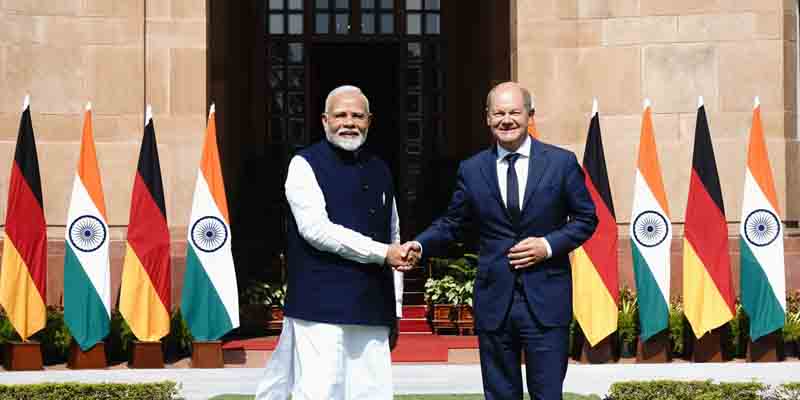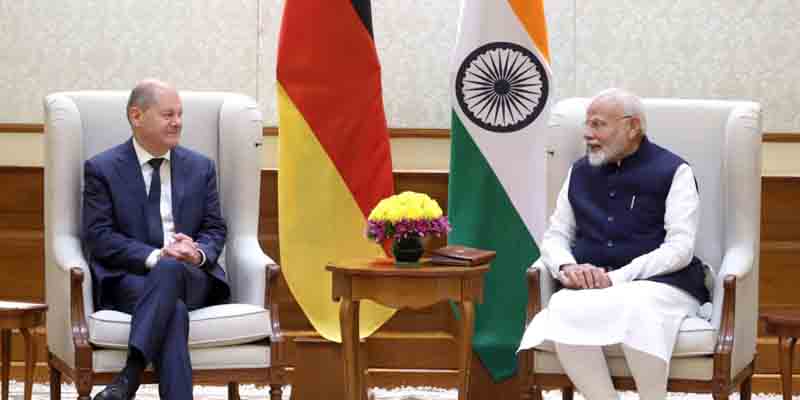- India
- Oct 27
India, Germany hold 7th Inter-Governmental Consultations
• Prime Minister Narendra Modi and Germany’s Chancellor Olaf Scholz co-chaired the seventh round of Inter-Governmental Consultations (IGC) in New Delhi.
• It was Scholz’s third visit to India as Chancellor. Both leaders appreciated the renewed momentum in bilateral engagement across government, industry, civil society and academia that has played an instrumental role in advancing and deepening the ‘Strategic Partnership’ between India and Germany.
• Under the motto ‘Growing Together with Innovation, Mobility and Sustainability’, the 7th IGC placed particular emphasis on technology and innovation, labour and talent, migration and mobility, climate action, green and sustainable development as well as economic, defence and strategic cooperation.
What is the purpose of IGC?
• Since May 2000, India and Germany have had a ‘Strategic Partnership’ which has been further strengthened with the launch of Inter-Governmental Consultations (IGC) in 2011 at the level of Heads of Government. The IGC framework allows for a comprehensive review of cooperation and identification of new areas of engagement at the Cabinet level. India is among a select group of countries with which Germany has such a dialogue mechanism.
• As the third and fifth largest economies in the world respectively, Germany and India share a robust economic and developmental partnership. Besides strong economic ties, both countries have a shared interest in upholding democratic values, the rules-based international order, and multilateralism as well as the reform of multilateral institutions.
Highlights of 7th IGC:
i) India-Germany Innovation and Technology Partnership Roadmap: The year 2024 marks the 50th anniversary of the signing of the Inter-Governmental Agreement on Cooperation in Scientific Research and Technological Development which institutionalised the framework of Indo-German cooperation in Science & Technology, research and innovation. Both leaders expressed their appreciation on the successful 50 years of long standing collaboration in science and technology between the two countries and reaffirmed their support to expand it further through launching the ‘India-Germany Innovation and Technology Partnership Roadmap’ which will serve as a guideline to the public and private sectors and research institutions of the two countries to take forward our cooperation in the areas of renewable energy, startups, semiconductors, artificial intelligence (AI) and quantum technologies, climate risk and sustainable resource management, climate change adaptation as well as agroecology Both leaders further identified space and space technologies as an important and promising area for future prosperity, development, and possible cooperation.
ii) Mutual Legal Assistance Treaty in Criminal Matters (MLAT): With a view to ensuring closer collaboration to prevent, suppress, investigate and prosecute criminals, including crime related to terrorism, India and Germany concluded the Mutual Legal Assistance Treaty in Criminal Matters (MLAT). Both leaders agreed that the India-Germany MLAT is an important milestone in strengthening security cooperation between the two countries that will enable sharing of information and evidence, mutual capacity building and sharing of best practices between the two countries.
iii) Agreement on the Exchange and Mutual Protection of Classified Information: Both sides concluded the Agreement on the Exchange and Mutual Protection of Classified Information thereby creating a legal framework for cooperation and collaboration between Indian and German entities and providing guidance on how classified information should be handled, protected and transmitted.
iv) Green Urban Mobility Partnership: Signed a Joint Declaration of Intent to renew and further elevate the partnership in accordance with a shared vision to promoting in India sustainable urban mobility for all, recognising the importance of green and sustainable urbanisation for inclusive social and economic development and the strong results of the Green Urban Mobility Partnership since its establishment in 2019.
v) Green and Sustainable Development Partnership (GSDP): Both governments aim to substantially enhance bilateral, trilateral and multilateral cooperation in climate action and sustainable development. Both sides acknowledged the progress achieved thus far under the Indo-German Green and Sustainable Development Partnership (GSDP). During the 6th IGC, both governments had announced the GSDP, which serves as an umbrella for bilateral formats and joint initiatives in this field. This partnership, guided by shared commitments, seeks to accelerate the implementation of the goals outlined in the Paris Agreement and the SDGs.
vi) MoU on Disaster Mitigation: In furthering cooperation in the field of research in disaster mitigation, tsunami warnings, coastal hazards, early warning systems, disaster risk reduction and oceanography, polar sciences, biology and biogeochemistry, geophysics and geology, both governments welcomed the signing of the Memorandum of Understanding between Indian National Centre for Ocean Information Services (INCOIS) and Helmholtz-Zentrum Potsdam - Deutsches GeoForschungsZentrum, and between National Centre for Polar and Ocean Research (NCPOR) and AlfredWegener-Institut, Helmholtz-Zentrum für Polar- und Meeresforschung (AWI).
Manorama Yearbook app is now available on Google Play Store and iOS App Store


